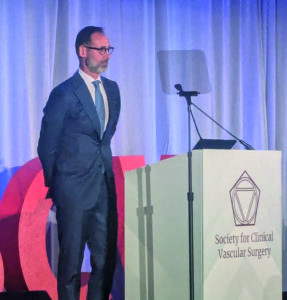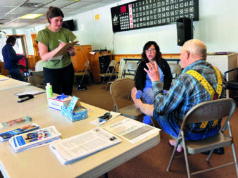
“We can almost be considered a specialty of colonizers, acquiring borrowed techniques. Why, then, do we see ourselves as the keepers of vascular care? Why do we think that we are the ones that can deliver the best vascular care? Without losing our identity, should we not look to partner with the other specialties providing vascular care?”
Those were some of the words uttered by outgoing Society for Clinical Vascular Surgery (SCVS) President Jean Bismuth, MD, as he delivered the 2025 SCVS presidential address under a theme of challenging the vascular surgical specialty to provide better and greater leadership.
Bismuth, the Tampa General Hospital and University of South Florida chief of vascular surgery, told those gathered that “the leader must own everything in his or her world, own every mistake and credit the team for successes” during the organization’s Annual Symposium in Austin, Texas (March 29–April 2).
Recalling national media coverage in recent years that placed inappropriate vascular interventions in the mainstream spotlight, he argued that vascular surgery “cannot blame every other specialty for our problems” and that “we need to own the solutions.”
“We need to own our own destiny and be accountable for what we do,” Bismuth continued. “There are bad players in every specialty. Let’s not think we are above reproach.”
His plea to reach beyond specialty lines was accompanied by a call for greater unity within the vascular surgery tent. “No different than our cardiology and radiology colleagues, the private practice vascular surgeon carries a huge load of vascular work and is generally doing excellent work,” he said. “We need to stop alienating our partners in vascular care.
“It is imperative that we appreciate that leaders are responsible for nurturing the growth of their teams, along with fostering individual strengths, over being threatened by honors not attributed to themselves.”
The imperative is mathematical, Bismuth pointed out: while there are 350 million people in the U.S., there are just 3,000 practicing vascular surgeons. “There is no way we can manage all of the vascular disease, so why are we so preoccupied with the noise of what other specialties are doing?”
Vascular surgery grew to become a specialty in its own right in the 1980s, with its forefathers cardiothoracic surgeons, Bismuth observed. “So, as we see how vascular surgery has evolved over the last 50-plus years, we could say that we have developed out of multiple specialties, including radiology with the innovations of Charles Dotter,” he said.
“To think that we alone can provide appropriate vascular care is probably somewhat misguided.”
To be a specialty that inspires, “provides safety and fosters fulfillment,” strong, capable leadership is required to make this vision a reality, Bismuth said, noting that the rising generation of vascular surgeons and future leaders, millennials, are more effective, transparent and open communicators than the generations who came before them. “If we truly embrace and prioritize effective communication, we could reshape both the perception and reality of personality dysfunction, leading to greater satisfaction, improved outcomes and a stronger ability to attract the best and brightest from then next generation.”
As the specialty confronts “a frontal assault” on reimbursements and associated “administrative harms,” unity across practice settings is necessary, which emboldens the need for effective leaders, Bismuth said. “We must become better ambassadors for our specialty,” he added.












